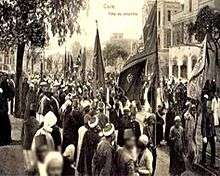Mawlid
Mawlid or Mawlid al-Nabi al-Sharif (Arabic: مَولِد النَّبِي, romanized: mawlidu n-nabiyyi, lit. 'Birth of the Prophet', sometimes simply called in colloquial Arabic مولد, mawlid, mevlid, mevlit, mulud, among other vernacular pronunciations; sometimes ميلاد, mīlād) is the observance of the birthday of Islamic prophet Muhammad which is commemorated in Rabi' al-awwal, the third month in the Islamic calendar.[4] 12th Rabi' al-awwal[5] is the accepted date among most of the Sunni scholars, while Shi'a scholars regard 17th Rabi' al-awwal as the accepted date.
| Mawlid | |
|---|---|
.jpg) Malaysian Sunni Muslims in a Mawlid procession in capital Putrajaya, 2013. | |
| Also called | Mawlid an-Nabawī (المولد النبوي), Eid-e-Milad un-Nabi, Havliye, Donba, Gani[1] |
| Observed by | Adherents of mainstream Sunni Islam, Shia Islam and various other Islamic denominations. As a public holiday in Afghanistan, Algeria, Bahrain, Bangladesh, Benin, Brunei, Burkina Faso, Chad, Egypt, Gambia, India, Indonesia, Iran, Iraq, Jordan, Kuwait, Lebanon, Libya, Malaysia, Maldives, Mali, Mauritania, Morocco, Niger, Nigeria, Oman, Pakistan, Senegal, Somalia, Sudan, Tunisia, and Yemen |
| Type | Islamic |
| Significance | Traditional commemoration of the birth of Muhammad |
| Observances | Hamd, Tasbih, fasting, public processions, Na`at (religious poetry), family and other social gatherings, decoration of streets and homes |
| Date | 12 Rabi' al-awwal |
| 2019 date | 10 November (Sunni, Ibadi[2]) 15 November (Shia)[3] |
| Frequency | once every Islamic year |
| Part of a series on |
| Muhammad |
|---|
 |
|
Views |
|
Related |
|
The history of this celebration goes back to the early days of Islam when some of the Tabi‘un began to hold sessions in which poetry and songs composed to honour Muhammad were recited and sung to the crowds.[6] The Ottomans declared it an official holiday in 1588,[7] known as Mevlid Kandil.[8] The term Mawlid is also used in some parts of the world, such as Egypt, as a generic term for the birthday celebrations of other historical religious figures such as Sufi saints.[9]
Most denominations of Islam approve of the commemoration of Muhammad's birthday;[10][11] however, with the emergence of Wahhabism/Salafism and the Ahmadiyya,[12] many Muslims began to disapprove its commemoration, considering it an illicit religious innovation (bid'ah or bidat).[13][14] Mawlid is recognized as a national holiday in most of the Muslim-majority countries of the world with the exception of Saudi Arabia and Qatar which are officially Wahhabi/Salafi.[15][16][17] Some non-Muslim majority countries with large Muslim populations such as India etc, also recognise it as a public holiday.[18]
Etymology
Mawlid is derived from the Arabic root word (Arabic: ولد), meaning to give birth, bear a child, descendant.[19] In contemporary usage, Mawlid refers to the observance of the birthday of Muhammad.[4]
Along with being referred to as the celebration of the birth of Muhammad, the term Mawlid also refers to the 'text especially composed for and recited at Muhammad's nativity celebration' or "a text recited or sung on that day".[20]
Date
According to the majority of Sunni Muslims and some Shi'as, Muhammad was born on the 12th of Rabi' al-awwal.[21][22][23][24] Many Twelver Shia Muslims on the other hand assert that Muhammad was born on the 17th of Rabi' al-awwal.[21][22] Though it is a matter of ikhtilaf or disagreement, since Shiite scholars such as Kulayni, Saduq, al-Thani, and others have affirmed the date of the 12th of Rabi' al-Awal. [25][26] Nonetheless, others contend that the date of Muhammad's birth is unknown and is not definitively recorded in the Islamic traditions.[27][28][29][30] The issue of the correct date of the Mawlid is recorded by Ibn Khallikan as constituting the first proven disagreement concerning the celebration.[31]
History
_gedragen_ter_gelegenheid_van_de_'Garebeg_TMnr_10003399.jpg)
In early days of Islam, observation of Muhammad's birth as a holy day was usually arranged privately and later was an increased number of visitors to the Mawlid house that was open for the whole day specifically for this celebration.[32] This celebration was introduced into the city Sabta by Abu 'l'Abbas al-Azafi as a way of strengthening the Muslim community and to counteract Christian festivals.[33]
The early celebrations, included elements of Sufic influence, with animal sacrifices and torchlight processions along with public sermons and a feast.[10][34] The celebrations occurred during the day, in contrast to modern day observances, with the ruler playing a key role in the ceremonies.[35] Emphasis was given to the Ahl al-Bayt with presentation of sermons and recitations of the Qur'an.
The exact origins of the Mawlid is difficult to trace.[36] According to Muhammad in History, Thought, and Culture: An Encyclopedia of the Prophet of God, the significance of the event was established when Muhammad fasted on monday, citing the reason for this was his birth on that day, and when Umar took into consideration Muhammad's birth as a possible starting time for the Islamic calendar.[36] According to Festivals in World Religions, the Mawlid was first introduced by the Abbasids in Baghdad.[37] It has been suggested that the Mawlid was first formalized by Al-Khayzuran of the Abbasids.[36] Ibn Jubayr, in 1183, writes that Muhammad's birthday was celebrated every monday of Rabi' al-awwal at his birthplace, which had been converted into a place of devotion under the Abbasids.[36][22] According to the hypothesis of Nico Kaptein of Leiden University, the Mawlid was initiated by the Fatimids,[38] with Marion Holmes Katz adding "The idea that the celebration of the mawlid originated with the Fatimid dynasty has today been almost universally accepted among both religious polemicists and secular scholars."[39] This Shia origin is frequently noted by those Sunnis who oppose Mawlid.[40]
According to Encyclopædia Brittanica, what the Fatimid's did was simply a court-procession of court-officials which did not involve the public but was restricted to the court of the Fatimid caliph.[41] Therefore, it has been concluded that the first Mawlid celebration which was a public festival was started by Sunnis in 1207 by Muẓaffar al-Dīn Gökburi.[41][42][43]
Observances
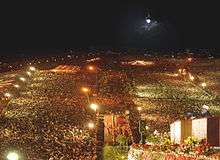
Mawlid is celebrated in almost all Islamic countries, and in other countries that have a significant Muslim population, such as Ethiopia, India, the United Kingdom, Turkey, Nigeria, Sri Lanka, France, Germany, Italy, Iraq, Iran, Maldives, Morocco, Jordan, Libya, Russia[44] and Canada.[45][46][47][48][49][50][51][52][53] The only exceptions are Qatar and Saudi Arabia where it is not an official public holiday and is forbidden.[54][55][56] However, In the last decades of the late 20th century there has been a trend to "forbid or discredit" Mawlid in the Sunni Muslim world.[57][58]
In Turkey, Mawlid (Turkish: Mevlud Kandili) is celebrated as a public holiday and traditional poems regarding Muhammad's life are recited both in public mosques and at home on the evening.[59] Often organized in some countries by the Sufi orders,[20] Mawlid is celebrated in a carnival manner, large street processions are held and homes or mosques are decorated. Charity and food is distributed, and stories about the life of Muhammad are narrated with recitation of poetry by children.[60][61] Scholars and poets celebrate by reciting Qaṣīda al-Burda Sharif, the famous poem by 13th-century Arabic Sufi Busiri. A general Mawlid appears as "a chaotic, incoherent spectacle, where numerous events happen simultaneously, all held together only by the common festive time and space".[62] These celebrations are often considered an expression of the Sufi concept of the pre-existence of Muhammad.[20] However, the main significance of these festivities is expression of love for Muhammad.[62]
During Pakistan's Mawlid, the day starts with a 31-gun salute in federal capital and a 21-gun salute at the provincial capitals and religious hymns are sung during the day.[63]
In many parts of Indonesia, the celebration of the Mawlid al-nabi "seems to surpass in importance, liveliness, and splendour" the two official Islamic holidays of Eid ul-Fitr and Eid al-Adha.[64]
In Qayrawan, Tunisia, Muslims sing and chant hymns of praise to Muhammad, welcoming him in honor of his birth.[65] Also, generally in Tunisia, people usually prepare Assidat Zgougou to celebrate the Mawlid.[66]
Among non-Muslim countries, India is noted for its Mawlid festivities.[67] The relics of Muhammad are displayed after the morning prayers in the Indian state of Jammu and Kashmir at the Hazratbal Shrine, where night-long prayers are also held.[68] Hyderabad Telangana is noted for its grand milad festivities Religious meetins,Night long prayers, Rallies, Parades and decorations are made throughout the city.
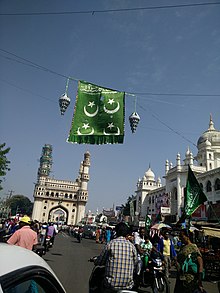
Mawlid texts
Along with being referred to as the celebration of the birth of Muhammad, the term Mawlid also refers to the 'text especially composed for and recited at Muhammad's nativity celebration' or "a text recited or sung on that day".[20] Such poems have been written in many languages, including Arabic, Kurdish and Turkish.[69] These texts contain stories of the life of Muhammad, or at least some of the following chapters from his life, briefly summarized below:[20]
- The Ancestors of Muhammad
- The Conception of Muhammad
- The Birth of Muhammad
- Introduction of Halima
- Life of Young Muhammad in Bedouins
- Muhammad's orphanhood
- Abu Talib's nephew's first caravan trip
- Arrangement of Marriage between Muhammad and Khadija
- Al-Isra'
- Al-Mi'radj, or the Ascension to heaven
- Al-Hira, first revelation
- The first converts to Islam
- The Hijra
- Muhammad's death
These text are only part of the ceremonies. There are many different ways that people celebrate Mawlid, depending on where they are from. There appears to be a cultural influence upon what kind of festivities are a part of the Mawlid celebration. In Indonesia, it is common the congregation recite Simthud Durar, especially among Arab Indonesians.
Permissibility
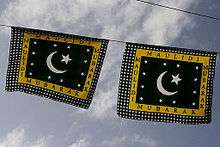
Among Muslim scholars, the legality of Mawlid "has been the subject of intense debate" and has been described as "perhaps one of the most polemical discussions in Islamic law".[30] Traditionally, most Sunni and nearly all of the Shia scholars have approved of the celebration of Mawlid,[10][11][70][71][72] while Salafi and Ahmadiyya scholars oppose the celebration.[14][73][74]
Support
Examples of historic Sunni scholars who permitted the Mawlid include the Shafi'i scholar Al-Suyuti (d 911 A.H.) who stated that:
My answer is that the legal status of the observance of the Mawlid – as long as it just consists of a meeting together by the people, a recitation of apposite parts of the Qur'an, the recounting of transmitted accounts of the beginning of (the biography of) the Prophet – may God bless him and grant him peace – and the wonders that took place during his birth, all of which is then followed by a banquet that is served to them and from which they eat-is a good innovation (bid'a hasana), for which one is rewarded because of the esteem shown for the position of the Prophet – may God bless him and grant him peace – that is implicit in it, and because of the expression of joy and happiness on his – may God bless him and grant him peace – noble birth.[75]
The Shafi'i scholar Ibn Hajar al-Asqalani (d 852 A.H.) too approved of the Mawlid[76] and states that:
As for what is performed on the day of the Mawlid, one should limit oneself to what expresses thanks to God, such as the things that have already been mentioned: [Qur'anic] recitation, serving food, alms-giving, and recitation of praise [poems] about the Prophet – may God bless him and grant him peace – and asceticism which motivate people to perform good deeds and act in view of the next world.[77]
The Damascene Shafi'i scholar Abu Shama (died 1268) (who was a teacher of Imam al-Nawawi (d 676 A.H.)) also supports the celebration of the Mawlid[78][79] as does the Maliki scholar Ibn al-Hajj (d 737 A.H.) who spoke positively of the observance of the Mawlid in his book al-Madhkal.[80] Likewise, the Shafi'i Egyptian scholar Ibn Hajar al-Haytami (d. 974 A.H.) was an avid supporter of the Mawlid and wrote a text in praise of it.[81] This was supported and commented on by the Egyptian scholar and former head of Al-Azhar University Ibrahim al-Bajuri[81] and by the Hanafi Syrian Mufti Ibn Abidin.[82] Another Hanafi Mufti Ali al-Qari (d. 1014 A.H.) too supported the celebration of the Mawlid and wrote a text on the subject[83] as did the Moroccan Maliki scholar Muḥammad ibn Jaʿfar al-Kattānī (d. 1345 A.H.).[84] Ibn al-Jazari (d. 833 A.H.), a Syrian Shafi'i scholar considers the celebration of the Mawlid to be a means of gaining Paradise.[85]
In the Muslim world, the majority of Sunni Islamic scholars are in favor of the Mawlid.[86] Examples include the former Grand Mufi of Al-Azhar University Ali Gomaa,[87] Muhammad Alawi al-Maliki[88][89] of Saudi Arabia, Yusuf al-Qaradawi,[90][91] the primary scholar of the Muslim Brotherhood movement, Habib Ali al-Jifri,[92] Muhammad Tahir-ul-Qadri,[93][94] Muhammad bin Yahya al-Ninowy[94][95] of Syria, Muhammad Ibn Ahmad al-Khazraji, president of the Heritage and History Committee of the United Arab Emirates[96] and Zaid Shakir, all of whom subscribe to Sunni Islam, have given their approval for the observance of Mawlid.
Opposition
Ibn Taymiyya's position on the Mawlid has been described as "paradoxical" and "complex" by some academics. He ruled that it was a reprehensible (makrūh) devotional innovation and criticised those who celebrated the Mawlid out of a desire to imitate the Christian celebration of Jesus's birthday.[97][98] At the same time, he recognised that some observe Muhammad’s birthday out of a desire to show their love and reverence of him and thus deserve a great reward for their good intentions.[97][99][100][101] The Salafi writer Hamid al-Fiqi (d. 1959) criticised Ibn Taymiyya for holding this view and stating that "How can they receive a reward for this when they are opposing the guidance of God's Messenger (pbuh)?".[89]
The Mawlid was not accepted by Wahhabi and Salafi.[102] Taj al-Din al-Fakihani (d. 1331), an Egyptian Maliki, considered Mawlid to be a blameworthy innovation that was either makruh or haram. This view was shared by fellow Egyptian Maliki Ibn al-Haj al-Abdari, who added that the celebration was never practiced by the Salaf.[103] However Ibn al-Haj affirms the auspicious qualities of the month of the Mawlid in the most effusive terms[104] and considers Muhammad's date of birth as a particularly blessed time of the year.[105] The Maliki scholar Al-Shatibi considered Mawlid an illegitimate innovation.[106] The Andalusian jurist Abu 'Abd Allah al-Haffar (d. 1408) opposed Mawlid, noting that had the Sahaba celebrated it then its exact date would not be a matter of uncertainty.[107] The former Grand Mufti of Saudi Arabia, Abd al-Aziz ibn Baz, along with Hammud ibn 'Abd Allah al-Tuwayjiri (d. 1992), another Saudi scholar, in their opposition also argued that there were many worthy occasions in Muhammad's life which he never commemorated, such as the revelation of the first verses of the Qur'an, the Night Journey and the hijra.[108][89]
While the Ahmadiyya deem the perpetual commemoration of Muhammad's life as highly desirable and consider the remembrance of him as a source of blessings, they condemn the common, traditional practices associated with the Mawlid as blameworthy innovations,[14][73][109] Gatherings limited to the recounting of Muhammad's life and character and the recitation of poetry eulogising him, whether held on a specific date of Rabi' al-awwal or in any other month, are deemed permissible.[73][110] Formal gatherings called Jalsa Seerat-un-Nabi commemorating Muhammad's life and legacy, rather than specifically his birth, are frequently held by Ahmadis and are often oriented towards both Muslim and non-Muslim audiences. These gatherings could be held in the month of the Mawlid but are promoted often throughout the year.[111][110]
Other uses
In some countries, such as Egypt and Sudan, Mawlid is used as a generic term for the celebration of birthdays of local Sufi saints and not only restricted to the observance of the birth of Muhammad.[112] Around 3,000 Mawlid celebrations are held each year. These festivals attract an international audience, with the largest one in Egypt attracting up to three million people honouring Ahmad al-Badawi, a local 13th-century Sufi saint.[9]
Gallery
 Mawlid an-Nabawi celebrations in Cairo in 1878
Mawlid an-Nabawi celebrations in Cairo in 1878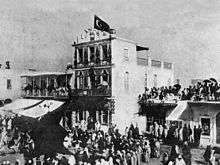
._25_%D0%B0%D0%BF%D1%80%D0%B5%D0%BB%D1%8F_2007.jpg) Mawlid under the supervision of Shaykh Sufi Riaz Ahmed Naqshbandi Aslami, 2007
Mawlid under the supervision of Shaykh Sufi Riaz Ahmed Naqshbandi Aslami, 2007
See also
References
- "Mawlid in Africa". Muhammad (pbuh) – Prophet of Islam. Retrieved 2 February 2016.
- "12 Rabi ul Awal 2019 - When is Eid Milad un Nabi 2019". IslamicFinder. Retrieved 15 October 2019.
- "Calendar of Observances 2019". Anti-Defamation League. 2018. Retrieved 15 November 2019.
- Mawlid. Reference.com
- The Sealed Nectar.
- "Mawlid an-Nabi: Celebrating Prophet Muhammad's (s) Birthday". The Islamic Supreme Council of America. Retrieved 5 November 2018.
- Shoup, John A. (1 January 2007). Culture and Customs of Jordan. Greenwood Publishing Group. p. 35. ISBN 9780313336713.
- Manuel Franzmann, Christel Gärtner, Nicole Köck Religiosität in der säkularisierten Welt: Theoretische und empirische Beiträge zur Säkularisierungsdebatte in der Religionssoziologie Springer-Verlag 2009 ISBN 978-3-531-90213-5 page 351
- "In pictures: Egypt's biggest moulid". BBC News. Retrieved 28 February 2016.
- Schussman, Aviva (1998). "The Legitimacy and Nature of Mawid al-Nabī: (analysis of a Fatwā)". Islamic Law and Society. 5 (2): 214–234. doi:10.1163/1568519982599535.
- McDowell, Michael; Brown, Nathan Robert (3 March 2009). World Religions At Your Fingertips. Penguin. p. 106. ISBN 9781101014691.
- Observing Islam in Spain: Contemporary Politics and Social Dynamics BRILL, 09.05.2018 ISBN 9789004364998 p. 101
- http://islamqa.info/en/249 Muhammed Salih Al-Munajjid.
- A Guide to Shariah Law and Islamist Ideology in Western Europe 2007–2009, Centre for Islamic Pluralism (2009), p.84
- March, Luke (24 June 2010). Russia and Islam. Routledge. p. 147. ISBN 9781136988998. Retrieved 10 May 2015.
- Merkel, Udo (11 February 2015). Identity Discourses and Communities in International Events, Festivals and Spectacles. Palgrave Macmillan. p. 203. ISBN 9781137394934.
- Woodward, Mark (28 October 2010). Java, Indonesia and Islam. Springer Science & Business Media. p. 169. ISBN 9789400700567.
- https://www.timeanddate.com/holidays/india/milad-un-nabi
- Arabic: قاموس المنجد – Moungued Dictionary (paper), or online: Webster's Arabic English Dictionary Archived 12 February 2009 at the Wayback Machine
- Knappert, J (1988). "The Mawlid". Orientalia Lovaniensia Periodica. 19: 209–215.
- Mahjubah, 16, 1997, p. 8
- The Princeton Encyclopedia of Islamic Political Thought, Princeton University Press, 2013, p. 335
- Tahir ul Qadri (2014), Mawlid Al-nabi: Celebration and Permissibility, Minhaj-ul-Quran Publications, p. 25
- John L. Esposito (1995), The Oxford Encyclopedia of the Modern Islamic World, Oxford University Press, p. 121
- Mohsen Kadivar, روز میلاد پیامبر بازگشت به رای متقدم تشیع
- Rasool Jafariyan, ولادت رسول خدا (ص) در دوازدهم یا هفدهم ربیع الاول؟
- Sanjuán, Alejandro García, ed. (2007). Till God Inherits the Earth: Islamic Pious Endowments in Al-Andalus (9–15th Centuries) (illustrated ed.). BRILL. p. 235. ISBN 9789004153585.
- Annemarie Schimmel (1994). Deciphering the signs of God: a phenomenological approach to Islam (illustrated ed.). Edinburgh University Press. p. 69.
- Eliade, Mircea, ed. (1987). The Encyclopedia of religion, Volume 9 (illustrated ed.). Macmillan. p. 292. ISBN 9780029098004.
- Fitzpatrick, Coeli; Walker, Adam Hani, eds. (2014). Muhammad in History, Thought, and Culture: An Encyclopedia of the Prophet of God [2 volumes] (illustrated ed.). ABC-CLIO. p. 368. ISBN 9781610691789.
- N. J. G. Kaptein (1993). Muḥammad's Birthday Festival: Early History in the Central Muslim Lands and Development in the Muslim West Until the 10th/16th Century. BRILL. p. 74. ISBN 9789004094529.
- Fuchs, H.; Knappert J. (2007). "Mawlid (a.), or Mawlud". In P. Bearman; T. Bianquis; C. E. Bosworth (eds.). Encyclopedia of Islam. Brill. ISSN 1573-3912.
- "Mawlid". Encyclopedia of Islam, Second Edition. BrillOnline Reference Works.
- "Mawlid". Encyclopædia Britannica. Encyclopædia Britannica, Inc. 2007.
- Kaptein (1993), p. 30
- Muhammad in History, Thought, and Culture: An Encyclopedia of the Prophet of God, ABC-CLIO, 2014, p. 365
- Festivals in World Religions, Longman, 1986, p. 230, 286
- Katz (2007), p. 2
- Katz (2007), p. 3
- Katz (2007), p. 113
- Mawlid, Encyclopædia Britannica
- Katz (2007), p. 50
- Katz (2007), p. 67
- "Mawlid celebration in Russia". Islamdag.info. Archived from the original on 12 September 2011. Retrieved 20 November 2011.
- "q News". q News. Archived from the original on 28 September 2011. Retrieved 20 November 2011.
- "Arts Web Bham". Arts Web Bham. 14 August 1996. Retrieved 20 November 2011.
- "Buildings of London". Buildings of London. Retrieved 20 November 2011.
- Js Board Archived 17 December 2007 at the Wayback Machine
- "United Kingdom". Sunni Razvi Society. Archived from the original on 25 February 2001.
- Bednikoff, Emilie. "Montreal Religious Sites Project". Mrsp.mcgill.ca. Retrieved 20 November 2011.
- "Muslim Media Network". Muslim Media Network. Archived from the original on 15 July 2012. Retrieved 20 November 2011.
- Canadian Mawlid Archived 9 October 2007 at the Wayback Machine
- "Religion & Ethics – Milad un Nabi". BBC. 7 September 2009. Retrieved 20 November 2011.
- "Moon Sighting". Moon Sighting. 20 June 2011. Retrieved 20 November 2011.
- Jestice, Phyllis G., ed. (2004). Holy People of the World: A Cross-Cultural Encyclopedia. ABC-CLIO. p. 410. ISBN 9781576073551.
- Elie Podeh (2011). The Politics of National Celebrations in the Arab Middle East (illustrated ed.). Cambridge University Press. pp. 256–7. ISBN 9781107001084.
- Reuven Firestone (2010). An Introduction to Islam for Jews (revised ed.). Jewish Publication Society. p. 132. ISBN 9780827610491.
- Marion Holmes Katz (2007). The Birth of The Prophet Muhammad: Devotional Piety in Sunni Islam. Routledge. p. 184. ISBN 9781135983949.
- Kenan Aksu Turkey: A Regional Power in the Making Cambridge Scholars Publishing, 18.07.2014 ISBN 9781443864534 p. 231
- "Festivals in India". Festivals in India. Retrieved 20 November 2011.
- Pakistan Celebrate Eid Milad-un-Nabi with Religious Zeal, Fervor Archived 14 December 2007 at the Wayback Machine. Pakistan Times. 2 April 2007.
- Schielke, Samuli (2012). "Habitus of the authentic, order of the rational: contesting saints' festivals in contemporary Egypt". Critique: Critical Middle Eastern Studies. 12 (2).
- Pakistan with Muslims world-over celebrate Eid Milad-un-Nabi tomorrow Archived 4 November 2005 at the Wayback Machine
- Herman Beck, Islamic purity at odds with Javanese identity: the Muhammadiyah and the celebration of Garebeg Maulud ritual in Yogyakarta, Pluralism and Identity: Studies in Ritual Behaviour, eds Jan Platvoet and K. van der Toorn, BRILL, 1995, pg 262
- Speight, Marston (1980). "The nature of Christian and Muslim festivals". The Muslim World. 70 (3–4): 260–266. doi:10.1111/j.1478-1913.1980.tb03417.x.
- How Does Tunisia Celebrate Al Mawlid? Archived 18 January 2014 at the Wayback Machine Tunisia Live
- "Milad Celebrated". The Times of India. 14 May 2003. Retrieved 20 November 2011.
- TajaNews Archived 14 December 2007 at the Wayback Machine
- Kenan Aksu Turkey: A Regional Power in the Making Cambridge Scholars Publishing, 18.07.2014 ISBN 9781443864534 p. 231
- Katz (2007), p. 169
- "Mawlid: The conservative view".
- "Mawlid al-Nabi: Celebrations across the Middle East". Middle East Eye. Retrieved 28 February 2016.
- "True Commemoration of the blessed life of the Holy Prophet (pbuh)", Al Islam Online
- Battram, Robert A. (22 July 2010). Canada in Crisis (2): An Agenda for Survival of the Nation. ISBN 9781426933936.
- Kaptein (1993), p. 49
- Katz (2007), p. 108
- Katz (2007), p. 64
- Katz (2007), p. 63
- Rapoport, Yosef (2010). Ibn Taymiyya and His Times. Oxford: Oxford University Press. p. 328. ISBN 9780199402069.
- Kaptein (1993), p. 58
- Spevack, Aaron (9 September 2014). The Archetypal Sunni Scholar: Law, Theology, and Mysticism in the Synthesis of al-Bajuri. SUNY Press. p. 77. ISBN 9781438453729.
- Katz (2007), p. 170
- Katz (2007), p. 112
- Katz, Marion Holmes (7 May 2007). The Birth of The Prophet Muhammad: Devotional Piety in Sunni Islam. Routledge. p. 102. ISBN 9781135983949.
there is no doubt that the Prophet's (s) recompense to someone who does something for him will be better, more momentous, more copious, greater and more abundant than [that person's] action, because gifts correspond to the rank of those who give them and presents vary according to their bestowers; it is the custom of kings and dignitaries to recompense small things with the greatest of boons and the most splendid treasures, so what of the master of the kings of this world and the next?
- Katz, Marion Holmes (7 May 2007). The Birth of The Prophet Muhammad: Devotional Piety in Sunni Islam. Routledge. p. 109. ISBN 9781135983949.
If Abu Lahab, the unbeliever whose condemnation was revealed in the Qur'an, was rewarded (juziya) in hell for his joy on the night of the Prophet's birth, what is the case of a Muslim monotheist of the community of Muhammad the Prophet who delights in his birth and spends all that he can afford for love of him? By my life, his reward (jaza ') from the Beneficent God can only be that He graciously causes him to enter the gardens of bliss!
- Katz (2007), p. 169: "In the eighteenth and nineteenth century, the celebration of the Prophet's (s) birthday and the recitation of mawlid texts were ubiquitous practices endorsed by the majority of mainstream Sunni scholars... by the modern period the celebration of the Mawlid was overwhelmingly accepted and practiced at all levels of religious education and authority. Prominent elite scholars continued to contribute to the development of the tradition."
- Gomaa, Sheikh Ali (1 January 2011). Responding from the Tradition: One Hundred Contemporary Fatwas by the Grand Mufti of Egypt. Fons Vitae. ISBN 9781891785443.
- Katz (2007), p. 253
- Rapoport, Yosef (2010). Ibn Taymiyya and His Times. Oxford: Oxford University Press. p. 322. ISBN 9780199402069.
- Shaykh Qardawi Approves of Celebrating Mawlid. Yusuf Al-Qardawi.
- "Shaykh Qardawi Approves of Celebrating Mawlid". www.sunnah.org. Retrieved 26 March 2016.
- Tahir-ul-Qadri, Dr Muhammad (1 May 2014). Mawlid Al-nabi: Celebration and Permissibility. Minhaj-UL-Quran Publications. ISBN 9781908229144.
- "Milad-un-Nabi gets colourful, elaborate – Times of India". The Times of India. Retrieved 26 March 2016.
- "Mass Moulood celebrated in Green Point | IOL". IOL. Retrieved 3 June 2016.
- Katz (2007), p. 203
- Marion Holmes Katz (2007). The Birth of The Prophet Muhammad: Devotional Piety in Sunni Islam. Routledge. p. 117. ISBN 9781135983949.
The rationale of expressing love for the Prophet was so compelling that it occasionally forced even opponents of the mawlid celebration to qualify their disapproval. Ibn Taymiya remarks that people may celebrate the mawlid either in order to emulate the Christians' celebration of Jesus's birthday, or "out of love (mahabba) and reverence (ta'zim) for the Prophet." Although the first motive is manifestly invalid, Ibn Taymiya acknowledges the latter intention as legitimate; one who acts on this motivation may be rewarded for his love and his effort, although not for the sinful religious innovation in itself.
- Rapoport, Yosef (2010). Ibn Taymiyya and His Times. Oxford: Oxford University Press. pp. 324–325. ISBN 9780199402069.
At the same time, Ibn Taymiyya recognizes that people observe the mawlid for different reasons and should be recompessed according to their intentions. Some, for example, observe the mawlid out of a desire to imitate the Christian celebration of Jesus's birthday on Christmas. This intention is reprehensible
- Islamic Law in Theory: Studies on Jurisprudence in Honor of Bernard Weiss. BRILL. 9 May 2014. ISBN 9789004265196.
Not only does Ibn Taymiyyah recognize the pious elements within devotional innovations, but he asserts that sincere practitioners of these innovations merit a reward. As I argue elsewhere, Ibn Taymiyyah's paradoxical position stems from a practical awareness of the way that Muslims of his day engaged in devotional practices. Ibn Taymiyya states that: "There is no doubt that the one who performs these [innovated festivals], either because of his own interpretation and independent reasoning or his being a blind imitator (muqallid) of another, receives a reward for his good purpose and for the aspects of his acts that confirm with the lawful and he is forgiven for those aspects that fall under the scope of the innovated if his independent reasoning or blind obedience is pardonable."
- Ahmed, editors, Yossef Rapoport, Shahab (2010). Ibn Taymiyya and his times. Karachi: Oxford University Press. p. 320. ISBN 9780195478341.
At the same time he recognized that some observe the Prophet's (s) birthday out of a desire to show their love of the Prophet and thus deserve a great reward for their good intentions.
CS1 maint: extra text: authors list (link) - Woodward, Mark (28 October 2010). Java, Indonesia and Islam. Springer Science & Business Media. p. 170. ISBN 9789400700567.
The Mawlid is among the most commonly mentioned examples of praiseworthy innovation. This view is shared even by some of the most strident opponents of most other modalities of popular Islam. Ibn Taymiyyah, the Kurdish reformer who most Indonesian and other Islamists take as their spiritual ancestor and mentor, was subdued in his critique of the Mawlid. His position was that those who performed it with pious intent and out of love for the Prophet Muhammad (s) would be rewarded for their actions, and forgiven any sin from bid'ah that they might incur.
- Bowering, Gerhard; Crone, Patricia; Kadi, Wadad; Stewart, Devin J.; Zaman, Muhammad Qasim; Mirza, Mahan (28 November 2012). The Princeton Encyclopedia of Islamic Political Thought. Princeton University Press. p. 335. ISBN 978-1400838554.
- Katz (2007), p. 71
- Katz (2007), p. 201
- Katz (2007), p. 65
- Katz (2007), p. 73
- Marion Holmes Katz (2007). The Birth of The Prophet Muhammad: Devotional Piety in Sunni Islam. Routledge. pp. 159–60. ISBN 9781135983949.
- Marion Holmes Katz (2007). The Birth of The Prophet Muhammad: Devotional Piety in Sunni Islam. Routledge. pp. 203–4. ISBN 9781135983949.
- "Does “Milad” Have Any Validity Whatsoever in the Holy Qur’an?" Ahmadiyya Anjuman Isha'at-e-Islam
- "Rabīʿ al-Awwal (I): The Blessed month of the Blessed Prophet (saw)", MuslimSunrise
- https://www.alislam.org/v/k-Seerat-un-Nabi.html?page=1 Seerat-un-Nabi
- Kaptein (2007)
Bibliography
- Kaptein, N. J. G. (1993). Muḥammad's Birthday Festival: Early History in the Central Muslim Lands and Development in the Muslim West Until the 10th/16th Century. Brill. ISBN 978-9-0040-9452-9.CS1 maint: ref=harv (link)
- Kaptein, N. J. G. (1991). "Mawlid". In Bosworth, C. E.; van Donzel, E. & Pellat, Ch. (eds.). The Encyclopaedia of Islam, New Edition, Volume VI: Mahk–Mid. Leiden: E. J. Brill. ISBN 90-04-08112-7.
- Katz, Marion Holmes (2007). The Birth of The Prophet Muhammad: Devotional Piety in Sunni Islam. Routledge. ISBN 9781135983949.CS1 maint: ref=harv (link)
Further reading
- Hagen, Gottfried (2014), "Mawlid (Ottoman)", in Muhammad in History, Thought, and Culture: An Encyclopedia of the Prophet of God (2 vols.), Edited by C. Fitzpatrick and A. Walker, Santa Barbara, ABC-CLIO.
- Malik, Aftab Ahmed (2001). The Broken Chain: Reflections Upon the Neglect of a Tradition. Amal Press. ISBN 0-9540544-0-7.
- Picken, Gavin (2014), "Mawlid", in Muhammad in History, Thought, and Culture: An Encyclopedia of the Prophet of God (2 vols.), Edited by C. Fitzpatrick and A. Walker, Santa Barbara, ABC-CLIO.
- Tahir-ul-Qadri, Muhammad (2014). Mawlid al-Nabi: Celebration and Permissibility. Minhaj-ul-Quran Publications. ISBN 978-1908229144.
- Ukeles, Raquel. "The Sensitive Puritan? Revisiting Ibn Taymiyya's Approach to Law and Spirituality in Light of 20th-century Debates on the Prophet's Birthday (mawlid al-nabī)." Ibn Taymiyya and His Times, ed. Youssef Rapport and Shahab Ahmed, 319–337. Karachi: Oxford University Press, 2010.
External links
| Look up mawlid in Wiktionary, the free dictionary. |
| Wikisource has original text related to this article: |
| Wikimedia Commons has media related to Mawlid. |
- Mawlid from the Encyclopedia of the Orient
- The Mawlid: The Conservative View
- The Mawlid: A Time to Celebrate
- Eid Milad un Nabi Images
